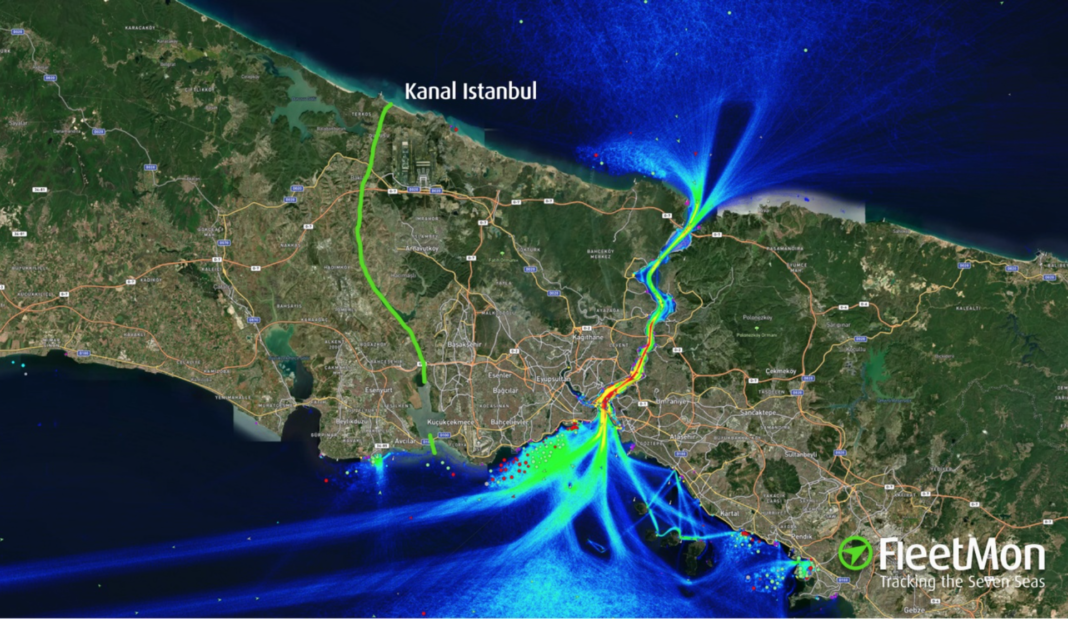Ahval, July 7, 2021, Cengiz Aktar
Internationally isolated, economically cornered and domestically self-bankrupt, the Turkish government has resorted to a fast forward which looks more like a lethal golden shot.
The formula is quite basic and typical of the regime. In addition to an all-out construction frenzy, which has included roads, tunnels, bridges, prisons, military outposts on Kurdish territory, mosques, shopping centres, airports, seaports, mega vacation resorts, nuclear as well as coal-powered plants and hydroelectric dams, the government is seeking to impose by all means a second Bosporus between the Black Sea and the Marmara Sea, named Kanal Istanbul or the “Crazy Project”.
Revealed for the first time in 2011 by President Recep Tayyip Erdoğan ahead of parliamentary elections, the project has been met with widespread criticism by academia and environmental activists. Still, the government pursued the project without any consultative process regarding its potential impact. Indeed, all infrastructure and heavy industry projects in Turkey, Kanal Istanbul included, which are extremely harmful to the natural, urban, cultural and human environment, are exempted by official decree of any Environmental and/or Strategic Impact Analysis.
The interest of the potential victims of Kanal Istanbul has been insufficient from the beginning. Indeed, the absence of any serious and independent Environmental and/or Strategic Impact Analysis has given the impression that the project’s damages would be limited to the Istanbul area despite the fact that it will impact the seas surrounding it seriously.
Interest in Kanal Istanbul from the international media has been re-ignited by a fake opening at the end of June, which was intended to lure foreign banks into financing the project’s colossal costs. The international financial community has thus far been lukewarm to providing loans. Again, international reporting on Kanal Istanbul was focused on its impact on Istanbul and Turkey, rather than its wider environmental impact.
Let me list some of the potential negative consequences of the project beyond the Istanbul area as described by two scientists, Professor Cemal Saydam of Hacettepe University and Professor Ethem Gönenç of Istanbul Technical University:
- The hydrologic balance will be reversed between, on the one hand the cold and fresh waters of the Black Sea and on the other, the warm and salty waters flowing from the Mediterranean across the Sea of Marmara into the Black Sea.
- Although the Black Sea’s water level is approximately 30 centimetres higher than the Marmara, there is a two-way stream between the two, through the natural channel, the Bosporus Straits. The one-way flow of the new channel will force the Black Sea to constantly supply fresh water to the Marmara Sea without being able to be fed by the reverse stream that exists in the Bosporus supplying the Black Sea with warm and salty waters.
- This will be the beginning of an irreversible environmental disaster as the Black Sea will be emptied twice as fast with two taps while the flow rates and capacities of the rivers that feed the sea stay the same. That concerns its principal feeders the Danube, the Dnieper, the Dniester but also rivers of all riparian states.
- While the Black Sea slowly dries up, the warmth and the salinity of the Marmara and the Mediterranean will change. The Marmara will become a putrefying water mass irreversibly altered, with devastating consequences for marine and urban life.
- The part of Thrace that lies between the new channel and the Bosporus will become an island and its underground water sources will be replaced by sea water.
- Once built, the new channel will be irreversible.
- Finally, the project is being built in the vicinity of Istanbul, a mega city cornered in a tiny territory between the Black Sea and the Marmara already inhabited by some 16 million people who have no breathing space left. Erdoğan’s dream of magnificence is poised to become a nightmare instead.
In view of so many negative factors, including the mammoth cost of the project, one may think that it is unrealisable. Given the economic and political dire straits Turkey is faced with, as well as the omnipotence of Erdoğan, it is highly probable that the ruler will go ahead with the project. Hence the “Crazy Project” may end up as a ‘Foolishness Project’.
Therefore, a Europe-wide awareness campaign, including Georgia, Russia and Ukraine, on the mortal dangers of the project would help to raise the attention of the public and concomitantly that of the decision-makers at all relevant levels, who would call upon the Erdoğan regime to seriously re-consider its domestic as well as trans-boundary responsibilities.
A first very critical step to raise international awareness has been taken by the Istanbul Metropolitan Municipality. It has recently initiated its Multidisciplinary Scientific Assessment covering all relevant aspects of the project. A 500 plus page assessment now exists in Turkish with executive summaries in English, German and French. The assessment by top experts on all issues related to Kanal Istanbul is a state-of-the-art work that needs to be taken seriously by all stakeholders.
Last but not least, within the framework of the Conference on the Future of Europe, the Citizens Assembly of Turkey is organising under the “Climate Change and Environment” cluster an awareness-building event entitled “Citizens for the Commons Across Borders: Beyond Istanbul Across the Sea of Marmara to the Black Sea and Europe” on Sept. 9 at 15:00-17:00 (CET).

